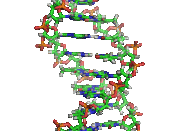With recent forensic science TV like CSI, it seems as though the glorified DNA is the savior of all crimes. While there is no denying DNA has incarcerated and freed many justifiably, there are major flaws that need to be addressed. It challenges the reasonable person standard, adversary system, discrimination laws, and privacy that the constitution provides. DNA has a big impact on the law, but should only be used within strict legislation to ensure it works at its fullest extent.
DNA tests are extracted by analyzing the pattern of strips that occur. If they are similar, there is a very strong chance it is a match. DNA is easily found in every cell in the body and for each person it is entirely unique unless there are identical twins. A variety of sources like blood, seamen, tissues, chemically treated tissues, hair root, saliva, urine, and products of conception are all used for DNA testing. When a crime is committed, a criminal will always leave behind a piece of himself. The reason DNA is not so readily available is because more than likely the police or environmental factors (heat, sunlight, moisture, bacteria, and mold) will contaminate the scene. Forensically valuable DNA can be found on evidence that is decades old, but the risk of contamination is high. Just like fingerprints, DNA testing cannot tell officers when the suspect was at the crime scene or for how long. DNA does more than just identify the source of the sample; it can place a known individual at a crime scene, in a home, or in a room where the suspect claimed not to have been. It can refute a claim of self-defense and put a weapon in the suspect's hand. It can change a story from an alibi to one of...


